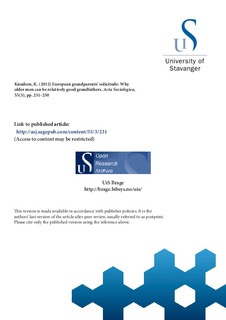| dc.contributor.author | Knudsen, Knud | |
| dc.date.accessioned | 2015-02-27T15:12:33Z | |
| dc.date.available | 2015-02-27T15:12:33Z | |
| dc.date.issued | 2012-09 | |
| dc.identifier.citation | Knudsen, K. (2012) European grandparents' solicitude: Why older men can be relatively good grandfathers. Acta Sociologica, 55(3), pp. 231-250 . | nb_NO |
| dc.identifier.uri | http://hdl.handle.net/11250/278063 | |
| dc.description | This is an author accepted manuscript of the article. See http://asj.sagepub.com/content/55/3/231 for the published version. | nb_NO |
| dc.description.abstract | The mechanisms linking grandparental gender and involvement with grandchildren are probably
more complex than previously understood. Grandmothers are likely to benefit from their central
role as kin-keepers in their provision of care, while grandfathers in their older years benefit more
from having a partner at their side. A basic argument here is that this indirect advantage for grandfathers
dampens the general age-related reduction in their capacity for caring, making them better
grandfathers than they otherwise would. Our reasoning rests primarily on normative explanations
emphasizing the relevance of social roles and institutionalized expectations. However, rational
choice theory represents an alternative theoretical strand that incorporates partly overlapping
empirical implications. We provide a simple theoretical framework for exploring mechanisms
behind grandmothers’ and grandfathers’ solicitude, and for assessing the credibility of the two main
alternative arguments, while keeping an eye on evolutionary theory. We use data fromthe Survey
of Health, Ageing and Retirement in Europe (SHARE), Release 2.3.0, waves 1 and 2. The empirical
results are to a certain extent in line with predictions from normative explanations as well as
rational choice theory. However, in regard to predicted consequences from living/not living with
a partner, the main findings are consistent with the former but at odds with the latter. Having a
partner in one’s older years increases individual capacity for involvement with grandchildren –
most notably in the case of grandfathers. On a more general sociological level, the empirical pattern
thus supports the idea that (older) men benefit more from the marriage institution or similar partnership
arrangement than women do. | nb_NO |
| dc.language.iso | eng | nb_NO |
| dc.publisher | Sage | nb_NO |
| dc.subject | grandparents | nb_NO |
| dc.subject | grandchildren | nb_NO |
| dc.subject | solicitude | nb_NO |
| dc.subject | grandparents’ care | nb_NO |
| dc.subject | grandparental involvement | nb_NO |
| dc.subject | normative explanations | nb_NO |
| dc.subject | marital status | nb_NO |
| dc.subject | marriage institution | nb_NO |
| dc.subject | rational choice theory | nb_NO |
| dc.subject | besteforeldre | nb_NO |
| dc.subject | barnebarn | nb_NO |
| dc.subject | sosiologi | nb_NO |
| dc.title | European grandparents' solicitude: Why older men can be relatively good grandfathers | nb_NO |
| dc.type | Journal article | nb_NO |
| dc.type | Peer reviewed | nb_NO |
| dc.subject.nsi | VDP::Social science: 200::Sociology: 220 | nb_NO |
| dc.source.pagenumber | 231-250 | nb_NO |
| dc.source.volume | 55 | nb_NO |
| dc.source.journal | Acta Sociologica | nb_NO |
| dc.source.issue | 3 | nb_NO |
| dc.identifier.doi | 10.1177/0001699312447962 | |
